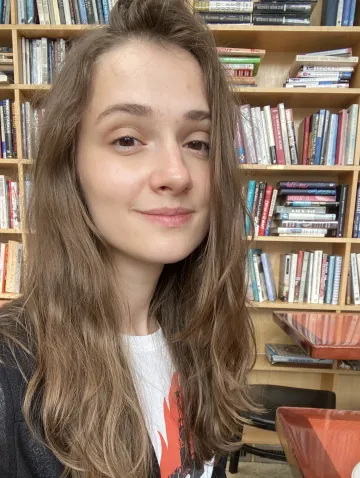Yuliya Charnyshova
PhD Student
Yuliya Charnyshova is a PhD student in the Department of Slavic Languages and Literatures , focusing on 20th-21st century Ukrainian, Belarusian, and Russian cultures and societies. Yuliya also serves as a social media assistant for the Ukrainian Studies Program.
Her research examines political dimensions of poetry, legacies of political violence, decolonial resistance, compassion, ethics, affect, reception and reader engagement, ecoqueer and feminist inquiries. She is also deeply interested in contemporary philosophy.
Before joining Yale, Yuliya lived in Ukraine, where she volunteered and worked on cultural and educational projects between 2022 and 2024.
Prior to that, she earned her Master’s in Russian and Comparative Literature from the Higher School of Economics in St. Petersburg and conducted research for her master's thesis at UCL’s School of Slavonic and East European Studies in London. That work examined layered and often overlooked dimensions of political resistance and dissensus in so-called “hermetic” and “difficult” poetries, focusing on Arkadii Dragomoshchenko and John Ashbery.
Yuliya received her BA in Literature through a double-degree program between Smolny College, St. Petersburg, and Bard College, New York, dividing her time between Russia and the United States. For her senior thesis, she researched the US post-World War II poetry, focusing on the poetics and politics of horizontal communication and reader engagement in the works of the so-called “New York School” poets.
Originally from Minsk, Belarus, Yuliya is also a poet and translator, now splitting her time between New Haven and Lviv, Ukraine.
As of 2025, Yuliya has presented her research at ASEEES, BASEES, the Central Slavic Conference, and other academic forums. Her scholarly work has been published in Novoe Literaturnoe Obozrenie, and her poetry and translations have appeared in Los Angeles Review of Books and Words Without Borders, among other publications. Her poetry reading was featured as one of three authors in a contemporary Belarusian literature event at ASEEES 2024.
Her research examines political dimensions of poetry, legacies of political violence, decolonial resistance, compassion, ethics, affect, reception and reader engagement, ecoqueer and feminist inquiries. She is also deeply interested in contemporary philosophy.
Before joining Yale, Yuliya lived in Ukraine, where she volunteered and worked on cultural and educational projects between 2022 and 2024.
Prior to that, she earned her Master’s in Russian and Comparative Literature from the Higher School of Economics in St. Petersburg and conducted research for her master's thesis at UCL’s School of Slavonic and East European Studies in London. That work examined layered and often overlooked dimensions of political resistance and dissensus in so-called “hermetic” and “difficult” poetries, focusing on Arkadii Dragomoshchenko and John Ashbery.
Yuliya received her BA in Literature through a double-degree program between Smolny College, St. Petersburg, and Bard College, New York, dividing her time between Russia and the United States. For her senior thesis, she researched the US post-World War II poetry, focusing on the poetics and politics of horizontal communication and reader engagement in the works of the so-called “New York School” poets.
Originally from Minsk, Belarus, Yuliya is also a poet and translator, now splitting her time between New Haven and Lviv, Ukraine.
As of 2025, Yuliya has presented her research at ASEEES, BASEES, the Central Slavic Conference, and other academic forums. Her scholarly work has been published in Novoe Literaturnoe Obozrenie, and her poetry and translations have appeared in Los Angeles Review of Books and Words Without Borders, among other publications. Her poetry reading was featured as one of three authors in a contemporary Belarusian literature event at ASEEES 2024.
Department: Slavic Languages and Literatures
